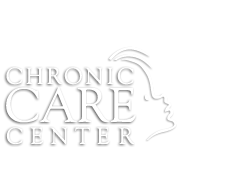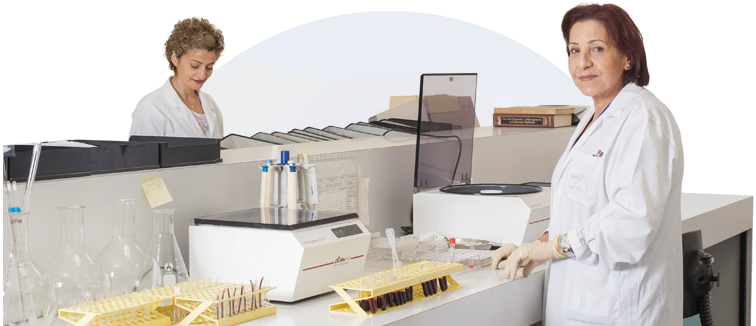Furthermore, our personnel is dedicated and attends numerous conferences, seminars and workshops.

Alpha-Thalassemia
Mutations of the HBA1 and HBA2 gene coding sequence, IVSI and IVSII are respectively identified by:
- ASO (Allele-Specific Oligonucleotide)
hybridization
Beta-Thalassemia
Mutations are identified by direct sequencing of the entire HBB gene coding region including the upstream and downstream regions of exon 1 and 3 respectively and the IVSI and IVSII.
Direct sequencing analysis identifying the most common point mutation or small insertions/deletions in the CFTR gene.
- Detection of the most common deletions in the dystrophin gene by Multiplex PCR.
- Linkage analysis may be used for carrier testing and prenatal diagnosis in case the most common deletions were not detected in the dystrophin gene but there is clinical evidence for DMD in the family.
Direct mutation analysis of the CGG repeat in the FMRI gene known to cause Fragile X syndrome.
Inversion of intron 1 and 22 in the Factor VIII gene is detected by means of overlapping/long distance PCR.
Genotyping of 16 STR (Short Tandem Repeat) markers using AmpℓFSTR Identifiler Kit.
The Genetics Research Laboratory is the first Laboratory in Lebanon who implemented in 2010; the PGD for B-Thalassemia and Sickle Cell Anemia. This test was introduced after Lab personnel’s training in a Reference Center and performing proper validation on site. The sensitivity and accuracy of this PGD fulfill the guidelines as set by the European Society of Human Reproduction and Embryology (ESHRE): Amplification efficiency is >90% and allele dropout <10%.
-PGD is recommended for couples at risk of transmitting a genetic disorder in order to avoid termination of affected pregnancies.
- Patients aiming at PGD have to go through in vitro fertilization (IVF) followed by a determination of the genetic status of the embryos in the Genetics Research Laboratory using highly developed molecular biology methods, before implantation.
- PGD for any other monogenic disease is available upon family and gynecologists’ request.
Amplification of exon 10 of the Human RhD by Real Time PCR.
Detection of HbS by direct sequencing of the exon1 of HBB gene. (HbC also require sequencing of the same exon).
Detection of exons 7 and 8 in both copies of the SMN gene by PCR and RFLP (Restriction Fragment Length Polymorphism).
Detecting the presence of Toxoplasma gondii DNA in fetal sampling by Real Time PCR.
- Detecting the three most common viable autosomal trisomies: trisomy 21 (Down syndrome), trisomy 18 (Edwards syndrome) and trisomy 13 (Patau syndrome) by QF-PCR (Quantitative Fluorescent Polymerase Chain Reaction).
- Additional markers on the sex chromosomes X and Y are used and restricted to detect Sex-linked diseases and/or sex chromosome aneuploidies (Klinefelter syndrome, Turner syndrome etc...)
Rapid prenatal diagnosis for aneuploidy is obtained within the same day of early receipt of samples.
- Molecular detection by PCR-based Multiplex assay for the presence / absence of regions associated with Azoospermia Factor (AZF), namely the regions that flank AZFa and cover AZFb, AZFc, AZFd.
- The SRY gene is included in the analysis as a control for the testis-determining factor on the Yp and for the presence of Y-specific sequences when ZFY gene is absent (e.g.XXmales).
Preimplantation Genetic Screening (PGS)
PGS for trisomy (13, 18, 21) and sex-linked diseases has been implemented in 2004 and improved in 2008 in order to optimize the results. The most important step in this improvement is the ability of the Genetics Research Laboratory to confirm the presence of the blastomere on the slide, locate its position and assess its quality.
Further tests are being developed to better serve families at risk of transmitting genetic disorders.



